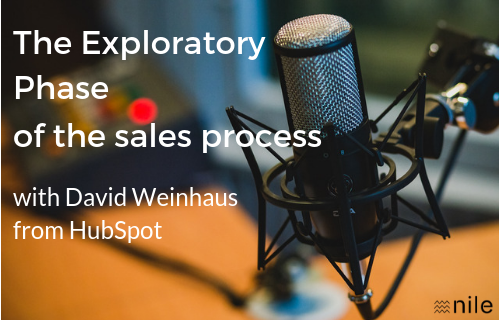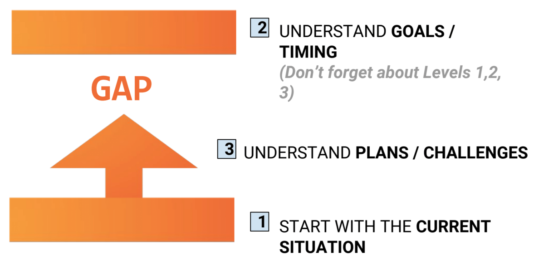The exploratory phase of the sales process - Interview with David Weinhaus from HubSpot
A few weeks ago, I was lucky enough to sit down for a chat with David Weinhaus, who leads the partner sales enablement at HubSpot.

More than that, David spent 8 weeks training me alongside fellow lions to become a better salesperson. This is why I was so excited to talk about the exploratory phase of the sales process with him.
1- Roleplaying is a lot of fun, and it will help you become a better salesperson
During my training at the Sales Skills Bootcamp with David and fellow lions, we had a lot of fun roleplaying: one of us would be the prospect and the other would be the salesperson.
More than just a bit of fun, this exercise is crucial for any salesperson who wants to get better at having great conversations:
"As a salesperson, it is really interesting to play the prospect, because you get to feel what it feels like to be a prospect."
By playing the prospect, you get to be in their shoes. Don't be shy, start roleplaying!
2- Your prospects are busy, bring context to the conversation
Over the last years, the job of a salesperson has changed dramatically.
"57% of the buyer's research has already been completed by the time that they typically reach out to a salesperson."
Before those days, a salesperson would have to educate their prospects, and would then be able to frame things and have the control of the call. But now, the buyer has his own perspective on things by the time he talks to a salesperson.
"Your job as a salesperson is to figure out how you can help them in a very efficient way, and that's very different than trying to convince someone, or to try to pitch them your products or services."
We will never say it enough: stop selling, start helping!
3- The exploratory phase of the sales process aims to... explore
During the exploratory phase of the sales process, you should be focused on understanding your prospect's needs and figuring out if it could be a good fit or not. It is not the time to start pitching in your products or services, or you might just fall into a pothole.
"The pothole that a lot of salespeople that I see fall into is that they hear a trigger word, and instantly switch to solutioning mode and get really excited. Then, they get themselves stuck in a situation where they are in solutioning mode without knowing anything about their prospect's context. And this is how you typically lose a sale."
The exploratory phase of the sales process is crucial because it is when you get really deep into understanding your prospect's objectives and needs, and the meaning behind it. Think of it as talking to a friend: you would not give them a recommendation without understanding their context, because it would not be helping them. Do not do it for your prospect either!
4- You have to listen if you want to find the gap
If you want to understand your prospect's problem, and how you could solve it or not, you need to be genuinely interested in what your prospect has to say.
In order to find the gap, you need to :
- Understand your prospect's context, where they are at today
- Understand their goal, what they want and need to achieve
- Understand how far the prospect would advance on that goal without you

This methodology helps you to see the white space that remains, and that is the famous gap.
"In an exploratory call, I usually start with the current situation. Then, I like to go to their goals for the year ahead, and try to really get specific on these. Then, I will test the "white space" remaining, and how important is achieving their goals for them. The final piece to find the gap is how much of that white space they can close on their own."
Thanks to this methodology, you can close your exploratory call by summarizing what you heard and understood on the current situation, the goals, and how much of these goals your prospect can achieve on their own.
"By summarizing these, you make sure that they're viewing the gap as much as you, which is crucial in the sales process."
When asking questions about their plan to achieve their goals, do not hesitate to challenge them, in order to help them see the gap. If they are pretty confident in their plan, do not hesitate to ask them why they wanted to talk to you in the first place.
5- Some skills to lead a great exploratory conversation
To help you lead a great exploratory call, here are a few skills and tactics that David share with me:
1. Don't take the cheese!
"In sales, the cheese is talking about what we are excited to talk about"
If you are to eager to talk about your solutions, you do not get to ask all the questions you need to ask, and will not be able to offer the best solution to your prospect's context.
As a salesperson, you need to be patient!
2. You are not the hero of the story
"In sales, we are storytellers. We are building a story with our prospects, and we are not the hero of the story. You have to make the prospect the hero of your story: it is their journey, you are the sidekick!"
If you start telling your own story to soon in the sales process. The time will come when it will be the good time to share what you can tell them what you could do for them, but you need them to realize their own journey first.
3. The 5 whys
This concept comes from the Japanese manufacturing business, and the idea is to lay out a root-cause analysis when you are trying to solve a problem on an assembly line. In order to find the root of a problem, you need to ask "why" 5 times.
"This is a useful concept to borrow for our purposes. This is a process that can help you understand the true meaning behind your prospect's goal and help you find the gap."
4. The give and get approach
"Your prospect feels like you are asking a bunch of questions and not giving anything in return."
In order to keep on exploring and gathering the information you need, do not hesitate to share something that is valuable. It will help your prospect to be less guarded an willing to share some information with you.
6- How to get started
In order to get started with this whole methodology and start leading great sales conversations, start by having a conversation between the sales and the marketing team.
"To be strategic in sales, you have to know who you help and with what problems. You want to know what profile you are looking for and to lay out a bunch of characteristics of what a good prospect is. To do this, sales and marketing people need to talk to each other!"
To get started with this methodology, do not hesitate to download our inbound sales guide (in French) below.
S’inscrire à la Newsletter
Tous les membres de l'équipe Nile sont des experts marketing et sales pour l'industrie, tous certifiés Hubspot et tous orientés process, data et performance.Notre culture code précise les valeurs dans lesquelles chacun(e) d'entre nous se reconnait. Nous recrutons et manageons sur la base de ce culture code.









